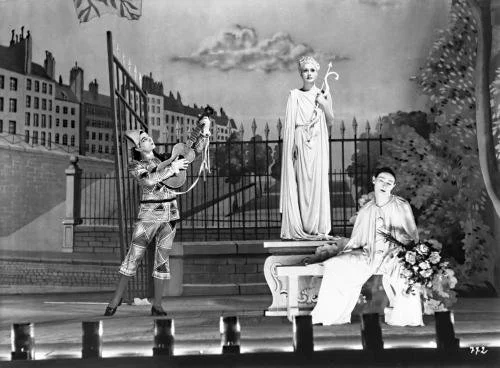Review: LES ENFANTS DU PARADIS
by Lucy Johns, Art and Film mentor
“Les Enfants du Paradis” is a sprawling 19th century novel of a film. it creates a familiar world in meticulous physical detail, develops a few paradigm characters an audience wants to know more about at every turn of their cosmopolitan lives, shimmers with cultural references for the educated commentator. It even lodges in the great European tradition of political subversion so veiled that censors beguiled by the story should not notice the challenge. It is, in short, an irresistible, unforgettable and timeless cinematic achievement.
Through what must have been heroic maneuvers to secure financing and space for his vision, director Marcel Carné built an immense Boulevard to frame his story of a woman so beautiful that men’s entire lives warp around their desire for her. The Boulevard signifies the era when such public spaces were new in Paris, circa 1830, exploding with street life reminiscent of but much bigger than its medieval antecedents. Great crowds, a constant flow of coaches and horsemen, blocks of sideshows throng the scene. One of the attractions is a completely naked woman to be viewed for only a few centimes. That she is immersed in a barrel of water, showing only her face, neck and sculptural shoulders, is unknown until the gullible are inside the peep show. A handsome aspiring actor makes the rounds of little theaters, pushing for a place with operatic flair and unflagging ambition. A sinister gangster plies his trade in theft, fencing, perhaps a murder here and there. A mime, so disrespected he performs on stage outside, not meriting the price of admission, slumps in his shapeless white garments, observing the surges of people through heavily painted eyes. These are the characters we will follow for the rest of the film. The woman, now clothed in a fetching dress, attracts the actor, who woes her with poetry and unmistakable lust. She brushes him off with magnetic charm, then enters the gangster’s storefront, apparently familiar, where he bores her with philosophical tirades explaining his misanthropic life and proclaiming indifference to love. She leaves, he follows, they pause to listen to a barker promoting a play. A fat gentleman sidles up to her, the stereotype distraction, while the gangster picks his pocket. He bawls accusations at the woman, attracting a gendarme who shouts for a witness. The mime awakens. His pantomime of the woman, the victim, the pickpocket and the crime entrances the crowd and relieves the woman of suspicion. She tosses him a rose. His fate is sealed.
The mime Baptiste is Jean-Louis Barrault, one of the greatest of the 20th century and surely the best such performance ever in film. The beauty Garance is Arletty, whose affair with a German officer during the Nazi occupation of Paris must’ve been a factor in Carne’s ability to get this film made in the middle of World War II. (It also earned her a prison term for collaboration after the War.)
Garance’s lovers - respectively the menacing crook, the histrionic actor and later an insufferable Count of the realm - play their roles to perfection. None is able to capture her love although sex is readily available.
This predicament of unrequited love is a pervasive theme of French films, the female object of desire whose body is compliant but whose heart is closely guarded. “Les Enfants” has deeper reverberations, however. Baptiste, who tells Garance of constant beatings by his father during childhood, escapes incessant pain in dreams and then in the wordless anguish his art projects. Art saves lives seemingly doomed to helpless failure. Did this theme influence Ingmar Bergman, whose Alexander in “Fanny and Alexander” is also going to be saved by artistic pursuit? Garance, beautiful, free-spirited, radiating joie de vivre, seems to be France itself, acquiescent but not conquered by German rule. Jeanne Moreau’s Catherine in Francois Truffaut’s “Jules and Jim” reprises this French archetype, acquiescent but not conquered by her German husband.
“Les Enfants du Paradis” is classical film-making, The camera is still nearly always, filming activity and conversation from a respectful distance. No hovering countable seconds over faces here, so annoyingly prevalent in contemporary movies. It also makes clever use of an ancient dramatic strategy, the play within the play, wherein to catch the conscience of the king. Many scenes occur on stages of theaters full of rapt patrons, an homage to theater as a social force. Garance’s aspiring actor rises to play Othello, where he can strangle the beloved he thinks he’s lost as a foil for the beloved he can’t lose because he never had her. Baptiste, too frightened to embrace Garance in real life when she waits patiently, rises to murder in a play to get some clothes that will let him follow his beloved into a ball. The crowds that began the film, so full of possibilities, end it by overwhelming any lovers who thought they might beat the odds.
Life, not love, is the paradise that “Les Enfants” must embrace. The film is not so much romantic as defiant for a time when no one could know the outcome of Nazi conquest of most of Europe. Such defiance keeps civilization going when power seems out of reach. This message resonates as deeply 70 years later, here in the United States, as it must have in France when “Les Enfants du Paradis” was made.


